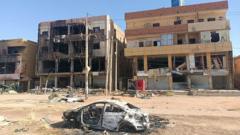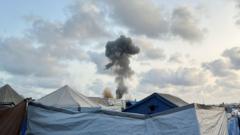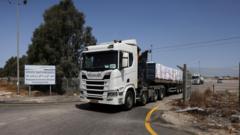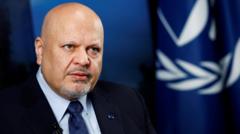The sanctions aim to restrict exports and financial borrowing, highlighting the US commitment to address violations of international law in Sudan's civil war.
US Imposes New Sanctions on Sudan Over Chemical Weapons Use

US Imposes New Sanctions on Sudan Over Chemical Weapons Use
The US government has announced new sanctions against Sudan, citing the use of chemical weapons in the ongoing civil conflict.
The United States has revealed its decision to impose new sanctions on Sudan, attributing the action to the country's reported use of chemical weapons in its civil war against the Rapid Support Forces (RSF). As articulated by the U.S. State Department, these sanctions include restrictions on exports to Sudan and the implementation of borrowing limits effective from June 6.
The conflict, which erupted two years ago over power struggles between the Sudanese military and the RSF, has had catastrophic consequences, resulting in over 150,000 deaths. The recent resurgence of fighting has seen the military regain control of Khartoum, though violence persists in other regions.
Specific details regarding the types of chemical weapons reported by the U.S. remain undisclosed. However, past reports, including one from the New York Times, indicated instances of chlorine gas use, which can elicit severe health repercussions and even fatal outcomes. The U.S. has called upon Sudan to immediately halt the use of chemical weapons and adhere to the Chemical Weapons Convention (CWC), to which the majority of nations, including Sudan, have subscribed.
In prior sanctions imposed earlier this year, U.S. authorities targeted both military and RSF leaders for their roles in exacerbating conflict and undermining democratic processes, with accusations against military leader Abdel Fattah al-Burhan and RSF head Mohammed Hamdan Daglo, also known as Hemedti. The extended fighting has led to the displacement of around 12 million people, leaving 25 million in dire need of food assistance.
Despite the new sanctions, analysts suggest they may have limited impact due to earlier restrictions. This decision has further strained relations regarding the involvement of the United Arab Emirates in the conflict. Sudan has accused the UAE of supplying arms to the RSF, an allegation the UAE has denied. Following a recent visit by U.S. President Donald Trump to the UAE, Congressional Democrats have attempted to block U.S. arms sales to the Emirati government, linking their actions to the Sudanese conflict.
As diplomatic relations continue to falter, a Sudanese diplomatic source criticized the U.S. sanctions as a diversion from Congressional scrutiny against the UAE’s actions in the region.
The conflict, which erupted two years ago over power struggles between the Sudanese military and the RSF, has had catastrophic consequences, resulting in over 150,000 deaths. The recent resurgence of fighting has seen the military regain control of Khartoum, though violence persists in other regions.
Specific details regarding the types of chemical weapons reported by the U.S. remain undisclosed. However, past reports, including one from the New York Times, indicated instances of chlorine gas use, which can elicit severe health repercussions and even fatal outcomes. The U.S. has called upon Sudan to immediately halt the use of chemical weapons and adhere to the Chemical Weapons Convention (CWC), to which the majority of nations, including Sudan, have subscribed.
In prior sanctions imposed earlier this year, U.S. authorities targeted both military and RSF leaders for their roles in exacerbating conflict and undermining democratic processes, with accusations against military leader Abdel Fattah al-Burhan and RSF head Mohammed Hamdan Daglo, also known as Hemedti. The extended fighting has led to the displacement of around 12 million people, leaving 25 million in dire need of food assistance.
Despite the new sanctions, analysts suggest they may have limited impact due to earlier restrictions. This decision has further strained relations regarding the involvement of the United Arab Emirates in the conflict. Sudan has accused the UAE of supplying arms to the RSF, an allegation the UAE has denied. Following a recent visit by U.S. President Donald Trump to the UAE, Congressional Democrats have attempted to block U.S. arms sales to the Emirati government, linking their actions to the Sudanese conflict.
As diplomatic relations continue to falter, a Sudanese diplomatic source criticized the U.S. sanctions as a diversion from Congressional scrutiny against the UAE’s actions in the region.


















